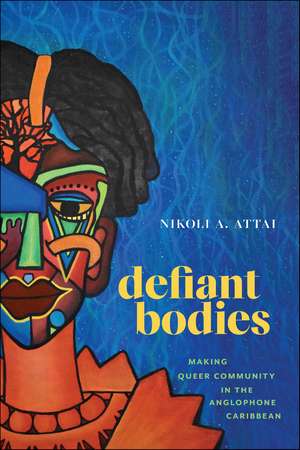Defiant Bodies: Making Queer Community in the Anglophone Caribbean: Critical Caribbean Studies
Autor Nikoli A. Attaien Paperback – 14 iul 2023
Din seria Critical Caribbean Studies
-
 Preț: 283.84 lei
Preț: 283.84 lei -
 Preț: 247.29 lei
Preț: 247.29 lei -
 Preț: 203.79 lei
Preț: 203.79 lei -
 Preț: 243.85 lei
Preț: 243.85 lei -
 Preț: 245.73 lei
Preț: 245.73 lei -
 Preț: 185.09 lei
Preț: 185.09 lei -
 Preț: 318.70 lei
Preț: 318.70 lei -
 Preț: 334.71 lei
Preț: 334.71 lei -
 Preț: 210.64 lei
Preț: 210.64 lei -
 Preț: 204.10 lei
Preț: 204.10 lei -
 Preț: 314.72 lei
Preț: 314.72 lei -
 Preț: 346.99 lei
Preț: 346.99 lei -
 Preț: 262.40 lei
Preț: 262.40 lei -
 Preț: 316.89 lei
Preț: 316.89 lei -
 Preț: 366.32 lei
Preț: 366.32 lei -
 Preț: 361.12 lei
Preț: 361.12 lei -
 Preț: 370.28 lei
Preț: 370.28 lei -
 Preț: 362.28 lei
Preț: 362.28 lei - 23%
 Preț: 778.69 lei
Preț: 778.69 lei -
 Preț: 359.13 lei
Preț: 359.13 lei - 23%
 Preț: 779.76 lei
Preț: 779.76 lei -
 Preț: 251.36 lei
Preț: 251.36 lei -
 Preț: 186.75 lei
Preț: 186.75 lei - 10%
 Preț: 910.98 lei
Preț: 910.98 lei - 10%
 Preț: 910.98 lei
Preț: 910.98 lei -
 Preț: 267.04 lei
Preț: 267.04 lei - 10%
 Preț: 910.98 lei
Preț: 910.98 lei -
 Preț: 360.09 lei
Preț: 360.09 lei -
 Preț: 323.83 lei
Preț: 323.83 lei - 10%
 Preț: 910.98 lei
Preț: 910.98 lei -
 Preț: 359.04 lei
Preț: 359.04 lei - 51%
 Preț: 498.27 lei
Preț: 498.27 lei -
 Preț: 405.13 lei
Preț: 405.13 lei
Preț: 253.93 lei
Nou
Puncte Express: 381
Preț estimativ în valută:
48.60€ • 52.77$ • 40.82£
48.60€ • 52.77$ • 40.82£
Carte disponibilă
Livrare economică 01-15 aprilie
Preluare comenzi: 021 569.72.76
Specificații
ISBN-13: 9781978830356
ISBN-10: 1978830351
Pagini: 212
Ilustrații: 26 B-W illus.
Dimensiuni: 152 x 229 x 15 mm
Greutate: 0.05 kg
Editura: Rutgers University Press
Colecția Rutgers University Press
Seria Critical Caribbean Studies
ISBN-10: 1978830351
Pagini: 212
Ilustrații: 26 B-W illus.
Dimensiuni: 152 x 229 x 15 mm
Greutate: 0.05 kg
Editura: Rutgers University Press
Colecția Rutgers University Press
Seria Critical Caribbean Studies
Notă biografică
NIKOLI A. ATTAI is an assistant professor of ethnic studies at Colorado State University.
Cuprins
Introduction: Queer Liberation in the
Anglophone Caribbean?
1 Liberating the Queer Caribbean
2 On the Ground: Challenging Sexual Politics in
the Region
3 Between the Walls: Ruination and New Sexual Worlds
in Barbados
4 Queens, Kings, and Kinship Networks: Queer Culture
and Trans(gressive) Community Making
5 Rumshops, Nightlife, and the Radical Praxis
of Internal Exile
Coda: A Defiant Politics of Hope in the
Queer Caribbean
Acknowledgments
Notes
References
Index
Anglophone Caribbean?
1 Liberating the Queer Caribbean
2 On the Ground: Challenging Sexual Politics in
the Region
3 Between the Walls: Ruination and New Sexual Worlds
in Barbados
4 Queens, Kings, and Kinship Networks: Queer Culture
and Trans(gressive) Community Making
5 Rumshops, Nightlife, and the Radical Praxis
of Internal Exile
Coda: A Defiant Politics of Hope in the
Queer Caribbean
Acknowledgments
Notes
References
Index
Recenzii
"Defiant Bodies honors the erotic autonomy and radical defiance of queer and trans people in the Caribbean. Through a fierce investigation into Caribbean sexual politics, the book offers an eloquent ethnographic study featuring engagement with Caribbean LGBTQ+ activists and careful critiques of human rights discourses. Ultimately, Nikoli Attai reveals the complex ways that queer people make community and create unexpected pathways for space and liberation in the region. Defiant Bodies is an outstanding contribution to the field of Caribbean queer and sexuality studies!"
"In Defiant Bodies, we finally have a book that centers trans Caribbean experiences, voices, and agency. Focusing on the lived experiences of Caribbean sexual and gender minorities, this book is a signal intervention because of its focus on resilience and agency rather than death and abjection. Attai embraces our 'unruly' and 'disruptive' trans and queer cousins, revealing their everyday experiences and resistance, as they create a 'politics of hope' for themselves that benefits us all."
"In Defiant Bodies, we finally have a book that centers trans Caribbean experiences, voices, and agency. Focusing on the lived experiences of Caribbean sexual and gender minorities, this book is a signal intervention because of its focus on resilience and agency rather than death and abjection. Attai embraces our 'unruly' and 'disruptive' trans and queer cousins, revealing their everyday experiences and resistance, as they create a 'politics of hope' for themselves that benefits us all."
Descriere
Defiant Bodies: Making Queer Community in the Anglophone extends the discourse on Caribbean sexuality, queerness, and trans experiences by focusing on several moments of community-making across the Anglophone Caribbean -- Barbados, Guyana, Jamaica, and Trinidad and Tobago -- including legal challenges against Caribbean laws, drag pageantry, kinship formations, and a co-opting of mainstream urban nightclubs and bars. These offer readers new ways to understand the creative and complicated ways that queer Caribbean people are responding to the dominant sexual politics in the region. They also reveal how queer people are envisioning transgressive ways of existing despite the various forms of violence that they face.
